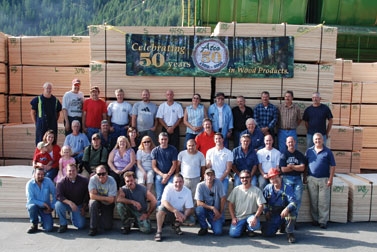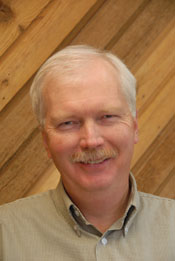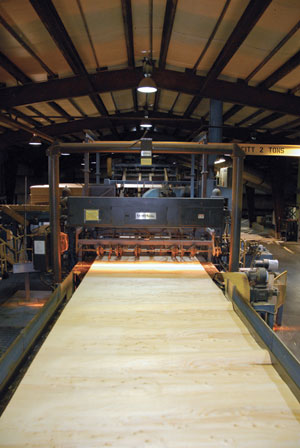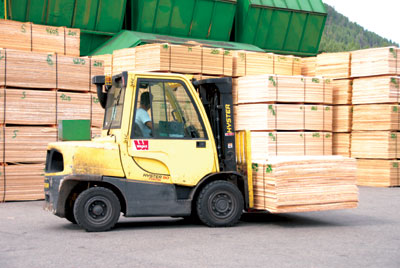
Features
Mills
Sawmilling
Third Generation
As a young child, Rebecca Weatherford remembers the employees from the ATCO lumber mill coming to her grandparents’ house for lunch. Her grandfather, Atle Nelson Sr., owned the family operation in Fruitvale, B.C. and lived just across a small pond from the mill site with her grandmother, Bertha Nelson. Today, after a few career deviations, Rebecca is president of ATCO Wood Products, which she runs with her husband, Scott Weatherford, who is the company’s CEO.
December 2, 2011 By Bill Tice
 The ATCO team at the company’s 50th anniversary celebrations in 2009. As a young child
The ATCO team at the company’s 50th anniversary celebrations in 2009. As a young child
It has been an interesting ride for the Weatherfords since, other than Rebecca’s childhood memories, neither of them had a forest industry background. Rebecca initially went into the hospitality industry, working for several major hotel chains in the U.S. and Canada, while Scott is from New Jersey and has a business background in truck and heavy equipment manufacturing.
“I must have sawdust in my blood somewhere,” jokes Rebecca. “My Grandfather bought the company in the mid-1950s and he had six sons, including my Dad, Ted, who was the youngest. The ownership of the company passed through several of the sons over the course of 50 years, until I purchased it from my father in 2007.”
Timing
Although the timing wasn’t great, Rebecca and Scott don’t have any regrets about leaving behind their hectic careers in the U.S. for the quieter lifestyle they have found in Fruitvale. “Six months after we bought the company, the bottom fell out of the market,” says Rebecca. “It was probably one of the worst times to get into this industry, but with the help of a great crew and team, we have settled in to the business and made it work.”

Company COO Mark Semeniuk, who came to ATCO in 2000 following a career with International Forest Products (Interfor) on the B.C. Coast, couldn’t agree more, “Clearly, the people and the team we have built here are our sweet spot,” he says. “We have a great crew and that has helped us get through this downturn in the economy and the challenges that came with it.”
Rebecca, who splits her time between the business and the couple’s two young children, says she wouldn’t have it any other way. “That employee involvement is extremely important to me and it’s great that when something needs to be done, everyone steps forward and jumps in.”
Scott says it is one of the reasons the company has managed to keep running through the tough markets. “We have a lot of great assets, from having access to an excellent fibre basket to a supportive group of customers and a rail line right to the plant that provides us with good access to our markets. But it is the culture of teamwork at this plant that allows all of those assets to come together around the mission of our company, which is all about producing exceptional quality wood products while being good stewards of the forest.”

The company did take one shift off in the veneer plant in 2008, but they were able to switch most of the effected employees to their whole log chipping operation, which was quickly configured with mostly existing equipment when the market opportunity appeared. “Our timing was good in that the Celgar pulp mill in nearby Castlegar needed to supplement their chipping operation at the time, so we were able to run two shifts on our chipper and keep almost everyone working,” explains Scott. “When Celgar went back to producing most of their own chips, we were able to go back to two shifts in the veneer plant and hire everyone back and then some.”
Keeping Up
When asked if they have done much in the way of upgrades since taking over the mill three years ago, Scott says, “We really haven’t stopped,” adding that “standing still would have been a death sentence” for the company. “We have looked very carefully at where we spend capital and we have targeted exactly where we want it to go,” he adds.
New equipment includes a hammer hog that allows ATCO to grind wood fibre to a smaller size and capitalize on an improved bark program, new peeler bins that facilitate improvements to the mill’s sorting system, and a new veneer thickness monitor that Semeniuk says was “an investment in quality.”
The new Altec thickness monitor was installed between the clipper and the stacker. It scans the veneer in three places and provides what Semeniuk explains is a major advantage in the marketplace. “When the plywood companies curtail production and need less veneer, they generally curtail the lower quality veneer first. The scanner helps us maintain our focus on quality and that helps differentiate us in the marketplace.”
Production Flow
Once the logs arrive at the mill, the production flow starts in the log yard where the logs are weighed, unloaded from the incoming trucks with a Caterpillar 980G wheel loader, scaled if necessary, and then sorted by species and placed into the mill’s log inventory as the logs are processed through the plant by species based on customer requirements.
Next in production is a single cut- off saw and a VK Kodiak double ring 36-inch debarker, which is followed by a pair of cut-off saws that bring the block size to 103.5 inches. Once the blocks are the correct length, they are fed into the peeler bins and then moved to one of nine conditioning chests with a John Deere 624H front-end loader. The logs spend approximately 24 hours in the conditioning chests before being hot loaded into the mill. From the mill infeed the blocks are sent to a Raute X-Y charger and then a Premier Gear lathe, which is followed by a Ventek scanner that checks for defects prior to a Raute clipper and then the new Altec thickness monitor. Next in line is a Raute stacker that was installed about 12 years ago. The stacker has three bins to accommodate full sheets of veneer and two bins for half sheets. Fish tails and random sizes are pulled off on the green chain, which will typically keep one to three employees busy, depending on the production run. Packaging is done with a hand strapper and the finished veneer packages are then taken out to the yard where they are put into inventory before being loaded onto trucks or railcars for shipment to customers.
Shipping is all done by truck and rail, and recently, ATCO ventured into the railway business when they acquired a 10 kilometer shortline that runs past the mill site and connects to another short track system before ultimately connecting to the Burlington Northern Santa Fe (BNSF) network. “BNSF started diversifying its short line business about 15 years ago and the section of track that runs past the mill was sold to a local entrepreneur,” explains Scott. “We were the only customer on this short line and the owner wanted to divest so we were able to secure the track, which also included an engine and a passenger car. It gives us a way to effectively transport our products to the market in Oregon and Washington.”

In addition to the Oregon and Washington markets, Rebecca says they sell their veneer in British Columbia. “We have gone further afield with some of our specialty products,” she adds. “We have sold large cores from logs to Mountain Equipment Coop that were used in a retail store in Burlington, Ontario, we have supplied logs for an export product to Japan that is used for high end sliding doors, and we have sold logs to timber and log home builders. We have even supplied logs to guitar makers where they will come to the mill and pick out the individual logs they want.”
Allan Plamondon, who runs the Cat 980 and has been around the mill for 30 plus years, says he likes the Weatherford’s “fresh way of looking at things,” while adding that the mill has been a great place to work. “Rebecca and Scott are really enthusiastic about the future and what they are doing here,” he says. “They are finding ways to diversify that are giving the company new revenue streams and that is important in markets like we have today.”
In addition to the specialty markets, the mill is also manufacturing landscape ties from cores. “We are one of the only companies that can still make the larger ties,” says Scott. “We make them in the plant and then we sell them to a company that sends them to the coast for treating.”
Reforestation and Community
But it’s not all about production for the senior management team at ATCO. They are extremely proud of the company’s reforestation record and their commitment to sustainability. “In a typical year, we will plant about 1.1 million seedlings,” says Mark MacAulay, ATCO’s silviculture supervisor who has been with the mill since 1989. “As part of our certification program with the Sustainable Forestry Initiative (SFI) we were just audited by KPMG and they confirmed that 99.9% of our harvest areas are replanted within one year of harvest,” he adds.
MacAulay says an intensive site preparation program and an exceptional seed program help the company stay on top of its silviculture obligations and these have helped them bring stands to the “free to grow” status much earlier than most companies. Free to Grow is the point where the Ministry of Forests and Range deems the stand to be self-sufficient.
Rebecca takes that and other messages to the community through school programs and an education program ATCO is involved with through the Interior Lumber Manufacturers’ Association, of which Semeniuk is the chair. “The adage my father, my uncles and my grandfather had through all of the years of environmental turmoil was keep your head down,” she says. “It may have worked for them in the past, but I threw the door open and said, ‘Come on in’. We have been very open with the community and we have done everything from hosting Rotary exchange tours to bringing Girl Guide and Scout groups through the plant along with school groups. We are really trying to extend our hand out to the community and when the company had its 50th anniversary last year, we had an open house where our loggers brought in their equipment and we had demonstrations showing how things work. We have also donated landscape bark and chips to parks and playgrounds. For us, our employees and our contractors, it’s about doing our part as a good corporate citizen and we are very proud of that.”
With forward looking vision, community involvement, a great fibre basket and of course, a committed team of employees, the Weatherfords envision ATCO being a big part of the southeastern B.C. landscape for a long time to come. In another 30 years, Rebecca and Scott’s young children may remember good times at the mill, and who knows, maybe they will become the fourth generation of the family to take the helm of the company.
Print this page